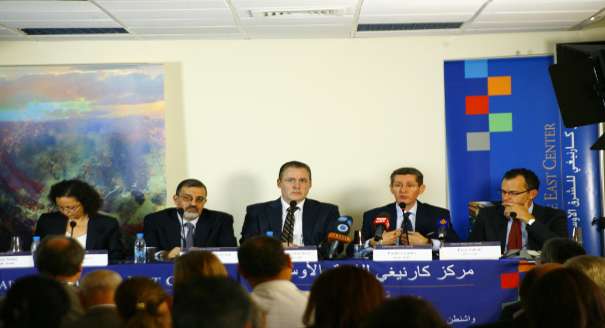Registration
You will receive an email confirming your registration.
For many, the Arab Spring represents the promise of a more just and democratic Arab world. The “Arab Development Challenges 2011” report by the United Nations Development Programme (UNDP) warns that without significant economic improvements and an increase in social equality, it will be difficult to manage the democratic transitions of the Arab Spring.
The report was presented at the Carnegie Middle East Center in Beirut by Mohammad Pournik, Poverty Practice Leader at UNDP-RCC, Noha El-Mikawy, Middle East Director of Ford Foundation, Abdallah Dardari, director of the Economic Development and Globalization Division at UN-ESCWA and Paolo Lembo, director of UNDP Regional Center in Cairo. Carnegie’s Paul Salem and Ibrahim Saif moderated.
The Rentier State
One of the underlying assumptions of the report was that the root cause of the Arab Spring was the collapse of the failed social contract based on revenue distribution in exchange for political acquiescence, explained Noha El-Mikawy. This system has instead generated profound inequality and, since it is solely supported by volatile energy resources, is not sustainable in the long run, she added.
Measuring Poverty
The statistics available to economists are deceiving because they do not necessarily take into account the full picture of political and economic exclusion in the Arab world, asserted Mohammad Pournik. He explained that a deficit of alternatives forced the report’s authors to use some indicators they know are inadequate at best, but added that they tried to consider those indicators in a wider social context.
- Economic Indicators: While the region does have pockets of massive material wealth, this capital has not benefitted general human welfare, said Pournik. The report stressed that while there is economic growth (particularly in a rise in incomes), there is also rampant political exclusion, disparity, resource mismanagement, and unemployment which makes such growth unfelt by the majority of the population.
- Corrupt Regimes: One of the reasons the data shows economic growth but does not show a reduction in levels of poverty is that huge amounts of capital in some Arab states are siphoned off to co-opt regime supporters, according to the report.
- Dependence on Oil: The report outlined how many Arab state economies are dependent on oil. In addition to oil’s volatile nature, this has been an obstacle to structural transformations, such as improved infrastructure, that often occur in non-energy dependent economies.
Inequality in the Arab World
- Similar to Latin America: Inequality in the Middle East is on a similar scale to that in Latin America, explained Pournik. Both regions have enormous disparities of wealth distribution within cities, between rural and urban centers, and among nations within the region.
- Lack of Job Creation: The report points out that one of the major challenges facing the Arab world is unemployment. Arab countries have a rapidly growing population, but only a small amount of job creation within these resource based economies. The lack of jobs is particularly hard for new entrants into the job market, especially women and youth. The report further notes that female participation in the job market in the Arab world is half the global average.
Pragmatic Political and Social Solutions
The report does not prescribe a specific political model as necessary for economic growth, explained Abdallah Dardari. Instead, it advocates a competitive economic system based on human dignity and inclusion and stresses the importance of mutual accountability between the states and their citizens.
- Increased Control: The report states that the fiscal systems of some states have lost mechanisms for control. For example, states with currencies tied to the U.S. dollar have effectively lost their ability to affect monetary policy strategies on a microeconomic level. The report stresses that economic imbalances in the Arab world cannot be corrected without the power to manage policies locally.
- Regional Integration: The Arab world needs greater regional integration to create a competitive economy, said Dardari. Arab states are already more closely linked than previously imagined, and integration must continue to instigate greater investment in the region.
Looking to the Future
The report is cautiously optimistic, acknowledging that significant problems face the region but contending that with appropriate action the region can be on its way to correcting existing imbalances. In particular, it notes that development strategies that have not worked previously may prove more effective now, because the Arab Spring has ushered in new political dynamics.
